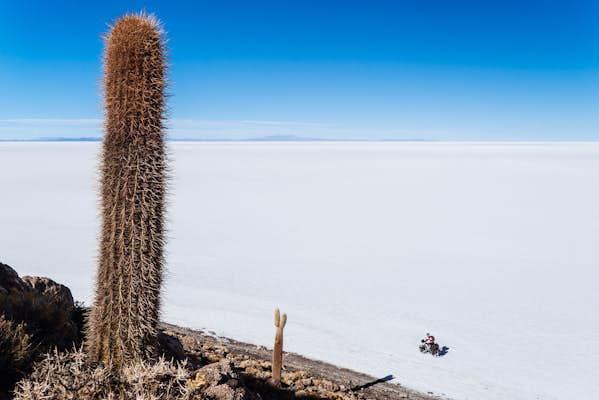Bolivia is rich in natural wonders, and it’s a place where anyone can scale the highest peak or pioneer a new route into undiscovered territory.
Known as the Tibet of South America, Bolivia’s landlocked terrain is actually extraordinarily diverse. Its main city, La Paz, sits 3640m up on the Andes’ vast Altiplano plateau, where the locals wisely chew or brew coca leaves to ease the punishing effects of altitude. But within hours of La Paz you can raft a lush jungle river, kayak the world’s highest lake or bathe in desert hot springs. Among the foothills that fall away to the east are pristine cloud forests and semi-arid canyons hiding pre-Incan ruins and underground worlds, with the Amazon basin stretching far to the north and the near-impenetrable Gran Chaco plain bordering the south.

Mountain biking
Bolivia’s Andean spine provides multiple downhill thrill-rides within easy reach of La Paz. Treacherous dirt roads, old mining tracks and ancient Inca trails plunge vertiginously from the parched Altiplano into the cloud forests of Amazon foothills where many first-descents can still be attempted.
By far the most popular route is the spectacular ‘Death Road’. From a chilly mountain pass north of La Paz, it’s a 65km, almost non-stop descent through the cloud-line and countless overhanging waterfalls to the balmy subtropical town of Coroico, 3600m below. Once called ‘the world’s most dangerous road’, a new highway on the opposite side of the valley means you’ll now share the perilously narrow switchbacks that hang over dizzying 300m drops with few other vehicles.
How to awaken your 5 senses in La Paz
But there are even wilder singletrack alternatives for experienced riders. From Cerro Chacaltaya (once the world’s highest ski resort, before its glacier melted in 2006, leaving the rickety 1939 ski hut stranded in scree) you can thunder 4300m towards the jungle floor of the Zongo Valley. It’s arguably the biggest one-day mountain-bike descent in the world.

While far from mountainous, don’t miss out on cycling the world’s biggest salt flats, the Salar de Uyuni. It’s a disorientating, surreal and unforgettable experience. In the vast white expanse, you’ll encounter Dalí-esque standing rocks, brightly coloured hot springs and miraculous colonies of chinchillas and flamingoes.

Horse Riding
The miniature Wild West of rust-red canyons and rugged hills in the south, surrounding Tupiza, is the biggest draw for horse-riding explorers. This is old bandit country, where Butch Cassidy and the Sundance Kid famously laid low while being hunted by the Pinkerton Agency, and you’ll feel every inch the outlaw trotting through remote gorges of majestic rock spires and cacti. You can follow in Butch and the Kid’s hoof marks to the frontier mining town of San Vicente on a three-day trek through sweeping badlands, although you’ll find no tombstone marked with their names in the eerie, edge-of-the-world graveyard where they were apparently buried after the famous shootout.
How to get off the beaten path in Bolivia
At the opposite end of the country, saddle up with the vanqueros (Bolivia’s poncho-wearing cowboys) on one of the vast estancias (ranches) in the tropical Reyes pampas. You’ll need to learn to lasso before heading out into the open grasslands on your steed to help round up livestock. Wading through piranha-infested lagoons, with the calls of howler monkeys and exotic birds overhead, you realise that this is a ranch experience like no other.

Hiking
The brilliant-white crowns of the Cordillera Real mountain range, which march in regal splendour from Lake Titicaca to La Paz, are the perfect place to try high-altitude trekking for the first time. Many of the summits can be reached on two- or three-day non-technical routes, from trailheads with quick road access. At just over 6000m, Huayna Potosí is the most accommodating (literally), with staffed huts up its glaciated eastern flank. But you’ll still encounter some huge, heart-stopping crevasses on the way to the steep final snow climb, where some exhilarating ice-climbing takes you to the airy summit. The thousand-kilometre views, like the rarefied air at this height, are breathtaking.
Elsewhere, all manner of jungle hikes are possible among the cloud forests of the Yungas valleys that lead to the Amazonian gateway town of Rurrenabaque, where machetes and dug-out canoes can take you into the fecund jungle. But don’t miss your chance to walk alongside dinosaurs in the Parque Nacional Torotoro, not far from Cochabamba. Among the dramatic canyons and caves in this high valley are great raised flanks of mudstone rock with the giant preserved footprints of unknown prehistoric creatures, marching up into the skies above you. Close by, the blind catfish of the Caverna de Umajalanta and the lush swimming holes and waterfalls of El Vergel are waiting to be discovered in this wondrously timeless world.
